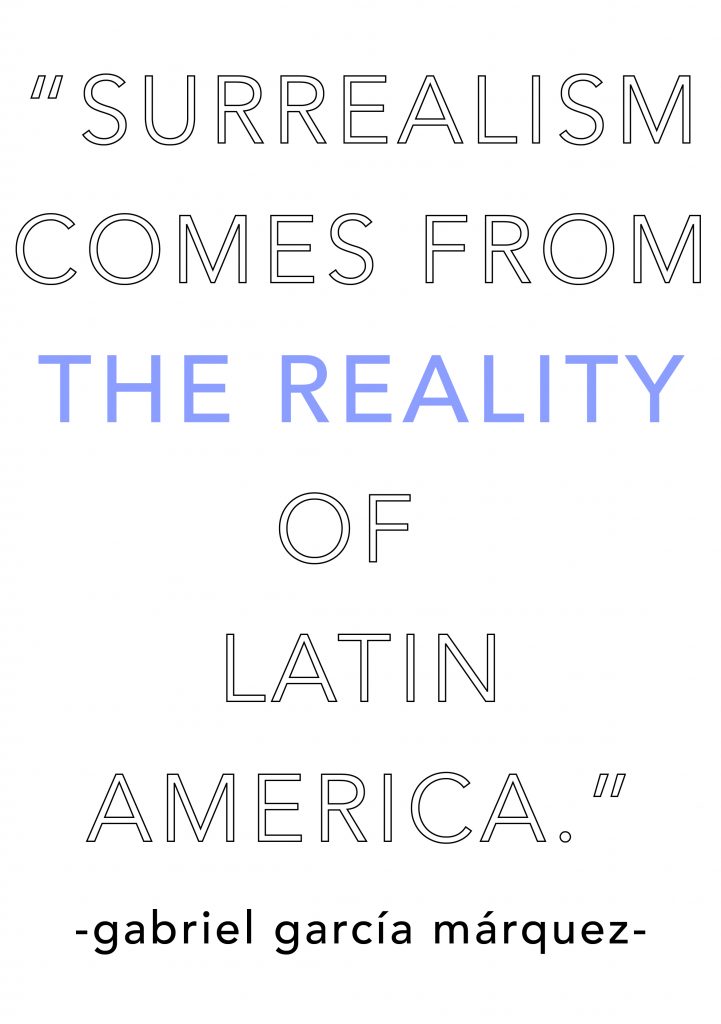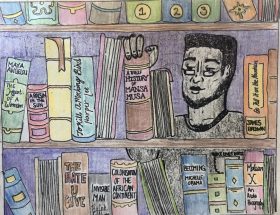
You don’t need me to tell you, as so many news reporters, employers, business owners and governments have so often noted, that we are living through a time of unprecedented and uncertain change. Picture this: it’s the 24th March 2020- the day after lockdown measures were announced in the UK-and the first thing I do is grab blindly for the first Harry Potter book, then subsequently check that my trusty, dogeared Gabriel García Márquez novel Cien años de soledad was still there, ready and waiting for me. Despite having neglected the former since a first pre-pubescent re-read, this seemed to be my rather unheroic instinct to such uncertainty. Many of us are reading much more now, given the long hours tucked away inside our homes; some are furloughed from work, some are enjoying the free time. And yet, when I stopped and thought of my reaction to this self-isolation period, it posed interesting questions on the merits of escapism– something many are surely yearning for in the age of Covid-19.
Escapism is defined as the tendency to seek distraction and relief from unpleasant realities, especially by seeking entertainment or engaging in fantasy. The unpleasant reality being a reported global death roll of 309,130, as of May 16th, due to the effects of Covid-19 and countless others hospitalised and sick, the need to stay indoors unless absolutely necessary, donning masks and gloves for the weekly food shop, your skin becoming scaly and amphibian from lathering antibacterial sanitiser. The list can become endless, beckoning panic attacks and a certain pervasive listlessness. Therefore, in my opinion, the qualities of escapism afforded by the magic realism genre are, at least to some, completely necessary during our experiences of lockdown. Countless critics and psychologists have ruminated on the effects, both detrimental and beneficial, of escapism. John Longeway preferred the term ‘self-deception’ for when one is utterly entrenched in escapism, noting the irrationality of avoiding self-awareness and the consciousness of one’s surroundings and situation. Jack Martin hailed escapism as a ‘risky’ coping mechanism. However, there are always two sides of a coin.
Escapism has been commended by many academics as a beneficial distraction strategy; a line of thought that I’m going to pick up and run with, as there is no scenario in which the UK’s lockdown measures can be outright ignored. We simply cannot lose a grip on the reality; it’s facing us, through the four walls in which we are ensconced. We are not forgetting; we are merely distracting from.
So, what do novels such as Harry Potter and Cien años de soledad offer by way of escapism? The genre of magic realism. Magic realism paints a realistic picture of the modern world while also adding magical elements. By blending the everyday with the miraculous, magic realism writers speak (or write) of the surreal in a manner that comes so naturally, the reader never feels the need to question it.
Both JK Rowling and Gabriel García Márquez employ magic realism to explore both difficult and meaningful themes: love, death, war, friendship, suffering. We can relate to these facets of life and apply them directly to many experiences, specifically in this case, to life during lockdown. In the case of the Harry Potter series, an ongoing debate grips the internet to this day on whether they are to be considered fantasy or magic realism. I would rather not open Pandora’s box with that one, and so will assume (in my personal experience) that the characteristics of magic realism these texts do possess offer the same level of escapism as a text concretely placed in the genre.
Child and adult readers alike follow the protagonist trio through various quests that span their seven years of education in Hogwarts School for Witchcraft and Wizardry, to ultimately save the wizarding world from the serpentine clutches of Lord Voldemort and his affinity for Dark Magic. We’re indulged with faraway tales of dragons, giants, spells, potions, Quidditch (flying on broomsticks), poltergeists, moving paintings, wands, extraordinary transformations, acts steeped in magic and fantasy; the impossible. If these themes do not divert the mind to purely imaginative activity, then I give up.
Although Hogwarts is, first and foremost, a magical school, the reader is also privy to the protagonist’s coming-of-age, his experience with falling in love with his best friend’s little sister. We have a drawn-out tale of Hermione and Ron’s realisation that they care for each other more than friends. We have snogging at the Yule Ball, a love potion epidemic, heartache and longing. In other words, we still have the usual blunderings of real teenagers growing up. Here, magic realism’s careful balancing act of believable elements of life, with the extraordinary pulls the reader back from complete alienation. How could we identify with Hermione if she wasn’t, behind all of the witchy enchantments, an exceptionally bright teenage girl? How else could we understand Harry’s emotional outbursts, having lost his godfather and headmaster to the depravity of the Death Eaters? Just as our enemy, right now, is this virus, so does Dark Magic spread through Hogwarts and neighbouring village Hogsmeade as well as Britain at large, as people are ‘taken’ by this evil agent.
A similar escapist experience is a hand also dealt by Gabriel García Márquez’s landmark novel Cien años de soledad (One Hundred Years of Solitude). The novel, for those unsure, tells the multi-generational story of the Buendía family, living in a fictitious town in Colombia. It is so often said that the works of this Colombian powerhouse are quintessential examples of magic realism, as García Márquez, similar to JK Rowling, effortlessly integrates elements of fantasy into otherwise realistic situations. The novel traverses a century in the lives of one family in the enchanted Latin American hamlet of Macondo. Just as Hogwarts was Rowling’s site of extraordinary happenings, so does Macondo become García Márquez’s stage for the display of unusual (seemingly impossible and fantastical) events. As we follow the Buendía family’s struggle between old and new ways of life; tradition versus modernity rises to Macondo’s civil war as the reader witnesses magic carpets fly, ghosts haunt villagers, and trickles of blood with lives and directions, convictions of their own.
In an extensive interview published in the January 1973 issue of The Atlantic, García Márquez states that ‘surrealism runs through the streets. Surrealism comes from the reality of Latin America.’ It is this notion of a reality that runs both in parallel to and intertwined with the surreal that, I believe, allows for such a positive escapist experience. We can hardly believe that we’re believing it. Luis Leal, in an article that focuses on the text at hand, postulated that García Márquez does not try to copy the magic genre, nor does he attempt to violate reality, sino de captar el misterio que palpita en las cosas,’ or to grasp the mystery that resides behind the surface. The world in which we are living is undoubtedly (and despite Boris Johnson’s frequent speeches) steeped in mystery. How does the virus spread? Can I exercise in the park? Should I wash my hair after I leave the house? Etc. etc. etc… We can take so much from this text, and the genre as a whole, especially considering García Márquez’s deliciously poignant and hopeful motivation, that ‘there is always something left to love.’
And so, in these small, seemingly insignificant ways, certain examples of literature can afford the opportunity of escapism from our own experiences of lockdown. As we navigate ourselves through situations that seemed, even a year ago, impossible, these texts that merge the mundane, the real, with the impossibly extraordinary, not only allow us a fiction with which we can identify, but also a welcome distraction from the anxieties associated with the age of Covid-19.
Art by Desiree Finlayson




